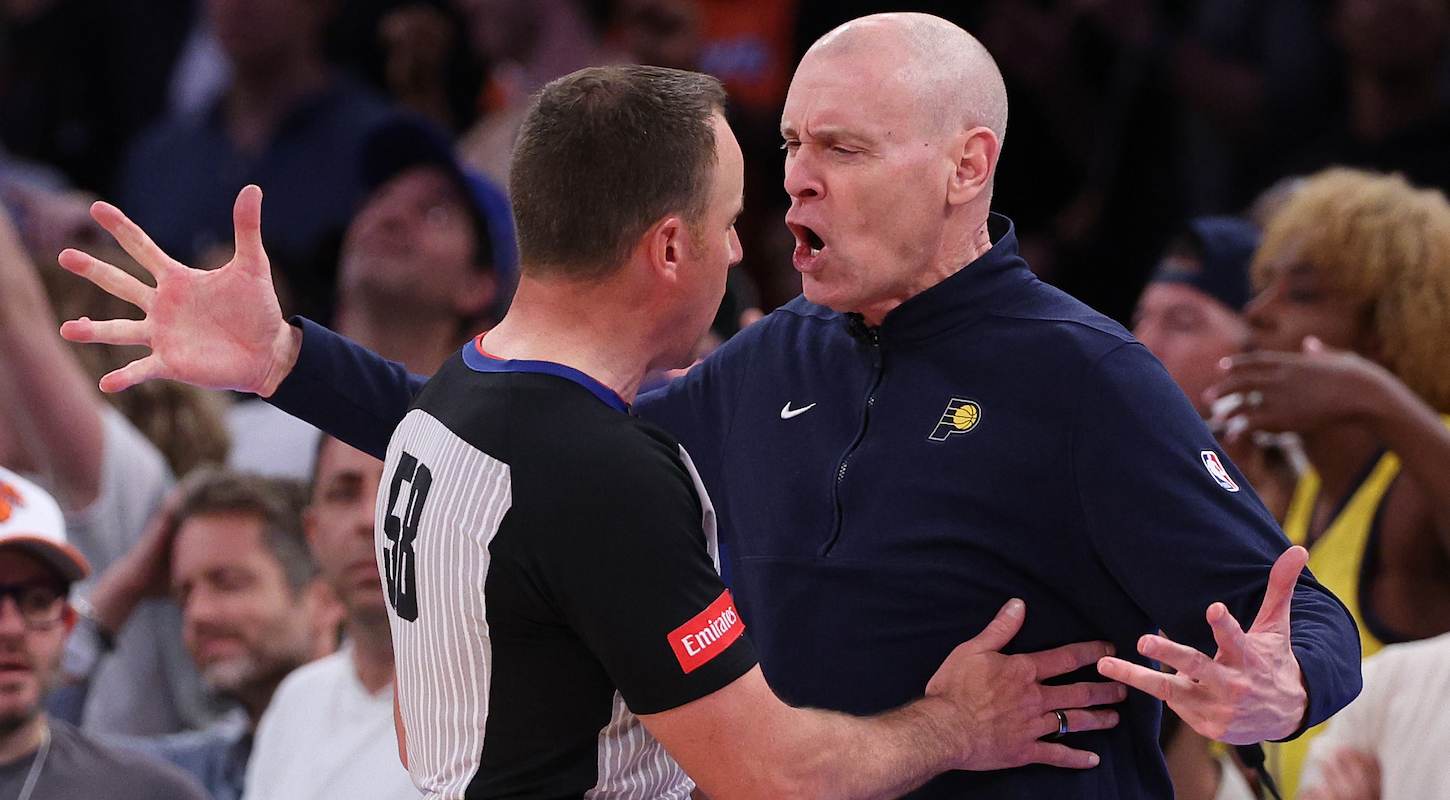The refereeing in the New York Knicks–Indiana Pacers playoff series has been ragged, inconsistent, and at times inexplicable, which is to say that it has been broadly normal NBA officiating. The Knicks have shot 12 more free throws and been whistled for six fewer personal fouls, marginal differences entirely legible as natural results of them having been both the host and the more assertive team in each of the first two games. The specifics are where the Pacers get mad.
In Game 1 New York benefited from a late, phantom kicked-ball violation against Indiana that couldn't be video reviewed, as well as from a, ah, strictly upstanding but nevertheless unusual offensive-foul call against Indiana when the Pacers were down a single point with 12 seconds to play—calls that directly affected the highest-leverage moments of a four-point Knicks win. In Game 2, Indiana head coach Rick Carlisle erupted like a volcano with a little over a minute remaining in the fourth quarter, when the officiating crew conferred and reversed—without video review—a clearly erroneous double-dribble violation whistled against New York's Isaiah Hartenstein. Denied the technical foul he so clearly wanted for his outburst, Carlisle kept up the theatrics for the next few possessions, and earned the ejection he'd been all but openly begging for with a little over 30 seconds left to go in what wound up being a nine-point Knicks win.
In his postgame remarks, Carlisle alleged a total of 77 discrete incidents—29 in Game 1, a whopping 48 in Game 2—of bad refereeing that the Pacers would be submitting to the league office for review, including a moment in the third quarter when, he claims, official JB DeRosa saw and ignored New York's Josh Hart intentionally shoving Indiana's Tyrese Haliburton in his injured back. He also implied, in so many words, that the referees overturned the double-dribble violation against Hartenstein more or less because Knicks coach Tom Thibodeau directed them to. A few moments later, he paused, gathered himself, and said, "Small-market teams deserve an equal shot."
This would be an incredibly serious insinuation, if Carlisle sincerely meant it! What he's saying is that the NBA, in which he has worked pretty much continuously for 40 years as a player and coach, is rigging playoff outcomes against its smaller-market members. Playoff outcomes move millions upon millions of dollars in television and ticket revenue and in salary bonuses for players, coaches, and executives; they figure heavily into job security up and down org charts, and into future contracts, and into Hall of Fame considerations. If Rick Carlisle actually meant what he's implying in this remark, it would not be a matter for a grumpy postgame press conference, but rather for a courtroom, or several. It would make the quiz show scandals of the 1950s look like bickering over a family-reunion card game.
The point here is not to defend the NBA against Carlisle's suggestion—hell, maybe the games are fixed!—but only to highlight how unserious it is. Carlisle does not believe this stuff, or at any rate the question of whether he believes it is entirely immaterial to his choice to perform, after Game 2, as though he does. He is working the refs, whether he's fooled himself into thinking it's a stand for justice or not. He is not trying to secure "an equal shot" for "small-market teams." He is trying to win Game 3 of the Eastern Conference semifinals, for the Indiana Pacers.
He just happens to have picked a particularly funny moment to use this line of argument—Mew mew mew, why won't the league be nice to us poor little small-market teams—to do it: when the Oklahoma City Thunder and Minnesota Timberwolves are steamrolling their way through the West; when the two star-studded Los Angeles teams went a combined 3-8 in their humiliating first-round dismissals; when the Denver Nuggets are the defending champs and the Milwaukee Bucks won rings two years ago; when his Pacers and the Cleveland Cavaliers represent half of the remaining East bracket. When, for that matter, the big-market silver-spooners he's up against haven't made a Finals since the year before (1999) the last time the Indiana Pacers did (2000), and the San Antonio Spurs have won four titles in the interim. And when that opposing team was down fully half of its normal rotation by the start of Wednesday night's fourth quarter.
Get a grip, buddy!






